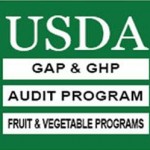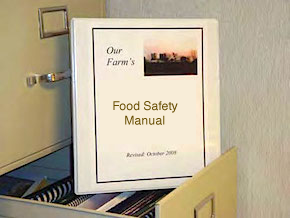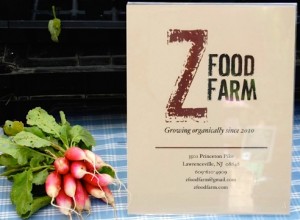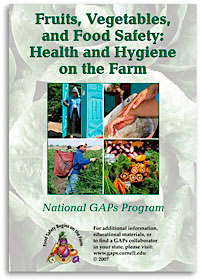Testing irrigation water for generic E. coli is something that every farm should do. Timing and frequency of this testing varies depending on your water source. Here is a cheat sheet: [Read more…]
Audit Ready:
Who Can Accompany You During A Third Party Audit?
Recently, a number of growers have asked:
“Who can accompany me during a third party food safety audit?”
Perhaps you had someone write your farm food safety plan for you or, you have a food safety consultant and you would like them to participate in or attend the audit.
 The USDA weighed in on this question and stated:
The USDA weighed in on this question and stated:
” There are no written requirements restricting the number of individuals on an audit. We allow the auditor to make that decision as far as how many people they wish to accompany them. A consultant can accompany the auditor and act as an observer but may not act as a participant in the audit.”
If you would like someone to accompany with you during the audit be sure to ask the inspector where they stand on who may attend the audit with you.
Audit Ready:
On-Farm Food Safety Lessons Learned Series
If you have written your food safety plan and are preparing for a third party audit, the Rutgers On-Farm Food Safety Team offers farm “walk-throughs” to help evaluate your written plan and compliance activities. Over many years of performing walk-throughs, we’ve found some common situations that can foil the goal of making it through the audit process on the first go-round. Take a moment to make sure you’ve handled these areas that have tripped-up fellow NJ growers.
Know the Contents of Your Food Safety Manual
If a grower hires someone to write his or her food safety manual, the grower must know what is in the manual and adhere to the contents! There have been instances when the auditors came to do the audit, that it was obvious the grower did not know what was in their own farm food safety manual.

Know Your Manual
- Sit down with the person developing the manual to make sure there is agreement about what to put in the manual.
- Once the manual has been developed, review each section to clarify and make necessary changes for the final version.
Remember, auditors use the grower’s food safety manual as the basis for the audit. If the grower does not know and understand the contents of their manual, they won’t be able to answer the auditors’ questions.
Have an On-Farm Food Safety question concerning your commercial NJ farm? Email us.
Why On-Farm Food Safety Will Not Go Away
The introduction of third party audits began the need for food safety education on New Jersey farms. Educational demands continue due to increasing produce buyer requirements and establishment of the federal government Food Safety Modernization Act. Meredith Melendez, Senior Program Coordinator of Mercer County and Wes Kline, make up the Rutgers On-Farm Food Safety Team. We are supported by Chris Kleinguenther of the New Jersey Department of Agriculture.
We expect to hold 8 to 10 training workshops this coming winter focusing on four tracks:
1) Preparing for a third party audit
2) General food safety training
3) Preparing for the Food Safety Modernization Acts Produce Rule
4) Advanced food safety
Here is a brief overview of food safety related programming offered by the Rutgers On-Farm Food Safety Program.
[Read more…]
Small Farm Post-Harvest Practices Workshop
Date: Tuesday, May 20, 2 PM to 4:30 PM
Location: Webinar presentation @ Rutgers Cooperative Extension Office of Mercer County, 930 Spruce Street, Trenton, NJ
Followed by on-farm portion @ Z Food Farm, 3501 Princeton Pike, Lawrence, NJ
Improving post-harvest practices can help minimize produce damage and maximize the amount of quality produce that can be sold at market. Evaluating current post-harvest practices and identifying low-cost improvements is an important part of farm planning, and should be done as early in the season as possible.
 Rutgers Cooperative Extension of Mercer County and NOFA-NJ welcome Lee Stivers from Penn State Extension as she joins us remotely giving a presentation on post-harvest handling procedures for high-quality, marketable produce via webinar.
Rutgers Cooperative Extension of Mercer County and NOFA-NJ welcome Lee Stivers from Penn State Extension as she joins us remotely giving a presentation on post-harvest handling procedures for high-quality, marketable produce via webinar.
The webinar workshop portion will be followed by a farm tour of Z Food Farm’s post-harvest handling set-up. Z Food Farm is a small certified organic farm located in Lawrenceville, NJ.
[Read more…]
Farm Food Safety: Think About Worker Training Now
 Worker health and hygiene training for farm workers, including family members, is an important step in reducing the risk for human pathogen spread on farms. Training of workers does not need to be complicated, but does need to be specific to your operation and your farm food safety plan (everyone should have one).
Worker health and hygiene training for farm workers, including family members, is an important step in reducing the risk for human pathogen spread on farms. Training of workers does not need to be complicated, but does need to be specific to your operation and your farm food safety plan (everyone should have one).
Worker health and hygiene training is required for passing a third party audit. Documentation must be kept regarding what workers were trained, when they were trained and what materials were used for the training.
A 15 minute training DVD produced by Cornell is available for $20 at both the Rutgers Cooperative Extension of Cumberland County office and the Rutgers Cooperative Extension of Mercer County office. This DVD is an excellent starting point for the training of farm workers on proper health and hygiene practices.

